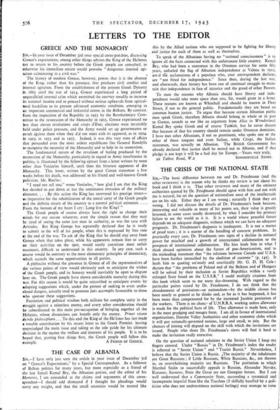GREECE AND THE MONARCHY
LETTERS TO THE EDITOR
Snt,—In your issue of December 3rd your spec:al corretpondent, discussing Greece's expectations, among other things advises the King of the Hellenes not to return to his country before the G;eek people are consulted, as otherwise his immediate return would provoke "dangerous internal agi- tation culminating in a civil war."
The history of modern Greece, however, proves that it is the absence of the King, rather than his presence, that produces civil conflict and Internal agitation. From the establishment of the present Greek Dynasty In 1863 until the war of 1914, Greece experienced a long period of unparalleled internal calm which permitted the country steadily to increase Its national income and to proceed without serious upheavals from agricul- rural feudalism to its present advanced economic condition, emerging as an important commercial and industrial centre in the Balkans. By contrast. from the imposition of the Republic in 1923 by the Revolutionary Com- mittee to the restoration of the Monarchy in 1935, Greece experienced no less than eleven revolutions and coups d'Etat; elections were invariably held under police pressure, and the Army would set up governments or revolt igainst them when they d:d not meet with its approval, as in 1924, In 1925, in 1933 and in 1935. Indeed, it was this very state of affairs that persuaded even the most ardent republicans like General Kondylis to recognise the necessity of the Monarchy and to help in its restoration.
The fundamental nature of the revulsion of feeling produced by the restoration of the Monarchy, particularly in regard to Army interference in politics, is illustrated by the following erract from a letter written by none other than Venizelos himself, until then the bitterest opponent of the Monarchy. This letter, written by the great Cretan statesman a few weeks before his death, was addressed to his friend and well-known Greek politician, Mr. Roufos: "I need not tell you." wrote Venizelos, "how glad I am that the King has decided to put down at last the continuous intrusion of the military elements. .. . By this action the King has recovered his prestige intact- ao imperative for the rehabilitation of the moral unity of the Greek people and the definite return of the country to a normal political existence. . . . From the bottom of my heart I cry: Long live the King!"
The Greek people of course always have the right to change their minds for any reason whatever, even the simple reason that they may be tired of seeing the same just man in authority, as was the case with Aristides. But King George has repeatedly declared that he is ready to submit to the will of his people, when this is expressed by free vote at the end of the war. To ask of the King that he should stay away from Greece when that takes place, while his opponents remain free to carry on their activities on the spot, would surely constitute most unfair treatment, difficult to understand in this country. In any case, such a course would be contrary to the most elementary principles of democracy, which accords the same opportunities to all parties.
A plebiscite without the presence in Greece of all the representatives of the various points of view would obviously seek to anticipate the wishes of the Greek people, and its honesty would inevitably be open to dispute later on. The Greek people have shown considerable maturity during this war. For this reason it would be quite unjustified to anticipate events by adopting suggestions which, under the pretext of seeking to avert undis- closed dangers, actually tend to promote faits accomplis favourable to those who sponsor these suggestions.
Patriotism 2nd political wisdom both militate for complete unity in the struggle against a relentless enemy, and every other consideration should be subordinated to this main pre-occupation of bringing together all the Hellenes, whose dissensions can benefit only the enemy. Primo vivere deinde philosophare ... To this end the King of the He'lenes has just made a notable contribution by his recent letter to the Greek Premier, leaving unprejudged the main issue and taking as the sole guide for his ultimate decision in the matter the welfare and interests of his people. It is to be hoped that, putting first things -first, the Greek people will follow this


























 Previous page
Previous page